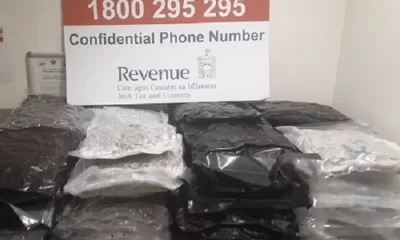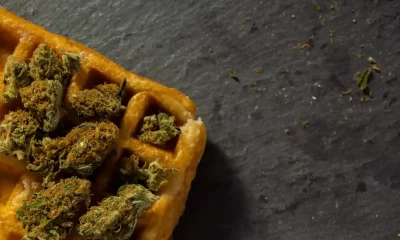Business
Nigerian Customs Authorities Seize Nearly 600 Pounds of Weed

Customs authorities in Nigeria announced this week that a patrol had seized nearly 600 pounds of illicit cannabis.
Customs authorities in Nigeria announced this week that a patrol had intercepted nearly 600 pounds of cannabis along a busy highway in the central part of the West African nation. Niger/Kogi Comptroller Busayo Kadejo said on Tuesday that 317 packages totaling 263.6 kilograms (more than 581 pounds) of illicit marijuana had been seized by the Nigerian Customs Service (NCS).
Following the seizure, the cannabis was handed over to Barrister Haruna Kwetishe, the Niger State Commander of the National Drug Law Enforcement Agency (NDLEA), in Minna, the capital of Niger state.
The cannabis was discovered by an Area Command of the Customs Service patrol along the busy highway between the cities of Lokoja and Abuja in the central region of Nigeria. Kadejo noted that the suspected cannabis smugglers had fled after abandoning the truck carrying the marijuana and were still at large.
Cannabis is illegal in Nigeria, with penalties for possession of marijuana ranging from 12 years behind bars to life in prison for large-scale trafficking. Despite the risk, however, cannabis is one of the most popular illicit drugs in the country, and Nigeria is one of the largest West African producers of illicit marijuana.
Following the discovery, Kadejo commended the work of the customs officers that resulted in the seizure of the cannabis. But he also noted that illicit drugs have become deeply ingrained in Nigerian society.
“This occasion has come with a dual feeling and sadness and joy in my heart. First and foremost is the fact that some people are working tirelessly to build this nation while others are engaged in acts that are inimical to the development of the same country,” said Kadejo. “I am glad that due to the diligent application of self to duty, our officials were able to intercept these illicit packages. If the packages had escaped our eyes, they would have helped in the execution and sustenance of crimes such as banditry, kidnapping, thuggery and other social services.”
Suspected Smugglers On The Run
Noting that the suspected cannabis smugglers had escaped and fled into the bush after their truck was stopped by customs officers, Kadejo warned area residents to be alert for their presence. He also said that the NCS is determined to put cannabis smugglers in the country out of business.
“I strongly feel it is important that as the general elections are drawing closer, it is the responsibility of all and sundry to be at alert and report suspicious activities to law enforcement agencies,” Kadejo said.
The local comptroller noted that he had received the approval of the Comptroller General of the Customs to transfer the seized cannabis to the Niger state command of the NDLEA, adding that “this shows the synergy that exists between the Nigeria Customs Service and the NDLEA.”
After accepting the seized cannabis, Kwetishe commended the customs service and said that the marijuana would be destroyed so it would not make its way to the illicit market.
“What the Customs has done is a clear case of synergy between the security agencies. It is a great job that the Customs have done,” said Kwetishe. “It has reassured us that Nigeria as a country is a project for everybody not necessarily for the security agencies. Anyone with information should call our attention to it and it will save lives.”
The NDLEA state commander also noted that any politicians using cannabis as an incentive to gain the support of young people in upcoming elections would be jailed until after ballots are cast.
“We assure the society that we will make Nigeria safe. Particularly in this period where drugs are used to ginger thuggery. I want to warn politicians that anybody in Niger state that wants to use drugs in this political era, NDLEA is able and ready to reign you in,” Kwetishe warned. “We will arrest you. You may not even see the elections. We will keep you till after the elections.”
Source: https://hightimes.com/news/nigerian-customs-authorities-seize-nearly-600-pounds-of-weed/
Business
New Mexico cannabis operator fined, loses license for alleged BioTrack fraud

New Mexico regulators fined a cannabis operator nearly $300,000 and revoked its license after the company allegedly created fake reports in the state’s traceability software.
The New Mexico Cannabis Control Division (CCD) accused marijuana manufacturer and retailer Golden Roots of 11 violations, according to Albuquerque Business First.
Golden Roots operates the The Cannabis Revolution Dispensary.
The majority of the violations are related to the Albuquerque company’s improper use of BioTrack, which has been New Mexico’s track-and-trace vendor since 2015.
The CCD alleges Golden Roots reported marijuana production only two months after it had received its vertically integrated license, according to Albuquerque Business First.
Because cannabis takes longer than two months to be cultivated, the CCD was suspicious of the report.
After inspecting the company’s premises, the CCD alleged Golden Roots reported cultivation, transportation and sales in BioTrack but wasn’t able to provide officers who inspected the site evidence that the operator was cultivating cannabis.
In April, the CCD revoked Golden Roots’ license and issued a $10,000 fine, according to the news outlet.
The company requested a hearing, which the regulator scheduled for Sept. 1.
At the hearing, the CCD testified that the company’s dried-cannabis weights in BioTrack were suspicious because they didn’t seem to accurately reflect how much weight marijuana loses as it dries.
Company employees also poorly accounted for why they were making adjustments in the system of up to 24 pounds of cannabis, making comments such as “bad” or “mistake” in the software, Albuquerque Business First reported.
Golden Roots was fined $298,972.05 – the amount regulators allege the company made selling products that weren’t properly accounted for in BioTrack.
The CCD has been cracking down on cannabis operators accused of selling products procured from out-of-state or not grown legally:
- Regulators alleged in August that Albuquerque dispensary Sawmill Sweet Leaf sold out-of-state products and didn’t have a license for extraction.
- Paradise Exotics Distro lost its license in July after regulators alleged the company sold products made in California.
Golden Roots was the first alleged rulebreaker in New Mexico to be asked to pay a large fine.
Source: https://mjbizdaily.com/new-mexico-cannabis-operator-fined-loses-license-for-alleged-biotrack-fraud/
Business
Marijuana companies suing US attorney general in federal prohibition challenge

Four marijuana companies, including a multistate operator, have filed a lawsuit against U.S. Attorney General Merrick Garland in which they allege the federal MJ prohibition under the Controlled Substances Act is no longer constitutional.
According to the complaint, filed Thursday in U.S. District Court in Massachusetts, retailer Canna Provisions, Treevit delivery service CEO Gyasi Sellers, cultivator Wiseacre Farm and MSO Verano Holdings Corp. are all harmed by “the federal government’s unconstitutional ban on cultivating, manufacturing, distributing, or possessing intrastate marijuana.”
Verano is headquartered in Chicago but has operations in Massachusetts; the other three operators are based in Massachusetts.
The lawsuit seeks a ruling that the “Controlled Substances Act is unconstitutional as applied to the intrastate cultivation, manufacture, possession, and distribution of marijuana pursuant to state law.”
The companies want the case to go before the U.S. Supreme Court.
They hired prominent law firm Boies Schiller Flexner to represent them.
The New York-based firm’s principal is David Boies, whose former clients include Microsoft, former presidential candidate Al Gore and Elizabeth Holmes’ disgraced startup Theranos.
Similar challenges to the federal Controlled Substances Act (CSA) have failed.
One such challenge led to a landmark Supreme Court decision in 2005.
In Gonzalez vs. Raich, the highest court in the United States ruled in a 6-3 decision that the commerce clause of the U.S. Constitution gave Congress the power to outlaw marijuana federally, even though state laws allow the cultivation and sale of cannabis.
In the 18 years since that ruling, 23 states and the District of Columbia have legalized adult-use marijuana and the federal government has allowed a multibillion-dollar cannabis industry to thrive.
Since both Congress and the U.S. Department of Justice, currently headed by Garland, have declined to intervene in state-licensed marijuana markets, the key facts that led to the Supreme Court’s 2005 ruling “no longer apply,” Boies said in a statement Thursday.
“The Supreme Court has since made clear that the federal government lacks the authority to regulate purely intrastate commerce,” Boies said.
“Moreover, the facts on which those precedents are based are no longer true.”
Verano President Darren Weiss said in a statement the company is “prepared to bring this case all the way to the Supreme Court in order to align federal law with how Congress has acted for years.”
While the Biden administration’s push to reschedule marijuana would help solve marijuana operators’ federal tax woes, neither rescheduling nor modest Congressional reforms such as the SAFER Banking Act “solve the fundamental issue,” Weiss added.
“The application of the CSA to lawful state-run cannabis business is an unconstitutional overreach on state sovereignty that has led to decades of harm, failed businesses, lost jobs, and unsafe working conditions.”
Business
Alabama to make another attempt Dec. 1 to award medical cannabis licenses

Alabama regulators are targeting Dec. 1 to award the first batch of medical cannabis business licenses after the agency’s first two attempts were scrapped because of scoring errors and litigation.
The first licenses will be awarded to individual cultivators, delivery providers, processors, dispensaries and state testing labs, according to the Alabama Medical Cannabis Commission (AMCC).
Then, on Dec. 12, the AMCC will award licenses for vertically integrated operations, a designation set primarily for multistate operators.
Licenses are expected to be handed out 28 days after they have been awarded, so MMJ production could begin in early January, according to the Alabama Daily News.
That means MMJ products could be available for patients around early March, an AMCC spokesperson told the media outlet.
Regulators initially awarded 21 business licenses in June, only to void them after applicants alleged inconsistencies with how the applications were scored.
Then, in August, the state awarded 24 different licenses – 19 went to June recipients – only to reverse themselves again and scratch those licenses after spurned applicants filed lawsuits.
A state judge dismissed a lawsuit filed by Chicago-based MSO Verano Holdings Corp., but another lawsuit is pending.
Source: https://mjbizdaily.com/alabama-plans-to-award-medical-cannabis-licenses-dec-1/
-

 Business2 years ago
Business2 years agoPot Odor Does Not Justify Probable Cause for Vehicle Searches, Minnesota Court Affirms
-

 Business2 years ago
Business2 years agoNew Mexico cannabis operator fined, loses license for alleged BioTrack fraud
-

 Business2 years ago
Business2 years agoAlabama to make another attempt Dec. 1 to award medical cannabis licenses
-

 Business2 years ago
Business2 years agoWashington State Pays Out $9.4 Million in Refunds Relating to Drug Convictions
-

 Business2 years ago
Business2 years agoMarijuana companies suing US attorney general in federal prohibition challenge
-

 Business2 years ago
Business2 years agoLegal Marijuana Handed A Nothing Burger From NY State
-

 Business2 years ago
Business2 years agoCan Cannabis Help Seasonal Depression
-

 Blogs2 years ago
Blogs2 years agoCannabis Art Is Flourishing On Etsy













